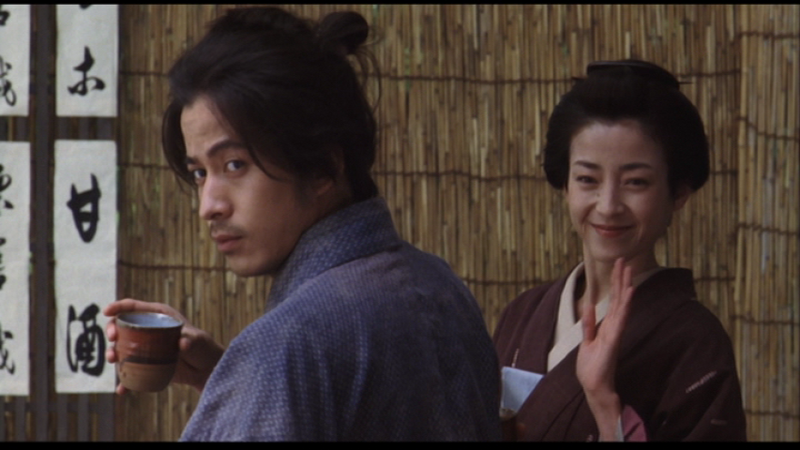Watched December 4 - December 10, 2006
Ce jour-là / That Day (Raoul Ruiz, 2003)
Klimt (Raoul Ruiz, 2006)
I have no hesitation in categorizing Ce jour-là as a masterpiece. Unique -- but (in part) rather like a mix of Bunuel, Rivette and Durenmatt, this tells the story of a scatty young heiress (Elsa Zylberstein), her greedy family (headed by papa Michel Piccoli), a deranged killer (Bernard Giraudeau) and a couple of seemingly indolent police officials (Jean-Luc Bideau and Christian Vadim). Released from the asylum so he can kill Zylberstein, Giraudeau instead becomes her protector. Often macabre, but very funny.
Klimt purportedly tells the story of the noted art nouveau painter (played by John Malkovich). It looks great -- but any resemblances to biographical fact are probably inadvertent. More a fever dream (which it may be) than a coherent narrative. Nikolai Kinski (Klaus's son) steals the show (whenever onscreen) as the young painter Egon Schiele.
Hana yori mo naho literally Even More Than Flowers (Hirokazu Kore'eda, 2006)
Following Yoji Yamada's lead, Kore'eda travels back into the past -- to the dawn of the 1700s. One sees sign not only of Yamada's inluence here, but also of the director who inspired Yamada himself -- Sadao Yamanaka. What we see here is the bottom rung of the samurai world, depicted with plenty of both humor and pathos. Our protagonist is Soza Aoki (Junichi Okada), who is expected by his clan to find and kill the man who killed his father in a brawl. Though he has not made much progress on his quest, he has made the acquaintance of a pretty widow (Rie Miyazawa) and her young son (who idolizes him). To keep busy, he has been running a school of sorts for the townsfolk, much to the disgust of the other down and out samurai in the neighborhood (some of the 47 Loyal Ronin -- biding their time in poverty, waiting for orders). His fellow samurai are also annoyed by his obvious lack of martialskills. When Aoki does discover his foe (Tadanobu Asano), he also discovers that the man is living virtuously with a widow (working as a commoner) and has "adopted" her son. To complicate matters, the two boys become friends. His dilemma, how to satisfy his relatives -- and yet not do any real harm.
this is a thoroughly enjoyable film. If a few spots are a little slow, they serve to give a flavor of the time in question. The Japanese new DVD looks quite good -- and has fine subtitles.

Klimt (Raoul Ruiz, 2006)
I have no hesitation in categorizing Ce jour-là as a masterpiece. Unique -- but (in part) rather like a mix of Bunuel, Rivette and Durenmatt, this tells the story of a scatty young heiress (Elsa Zylberstein), her greedy family (headed by papa Michel Piccoli), a deranged killer (Bernard Giraudeau) and a couple of seemingly indolent police officials (Jean-Luc Bideau and Christian Vadim). Released from the asylum so he can kill Zylberstein, Giraudeau instead becomes her protector. Often macabre, but very funny.
Klimt purportedly tells the story of the noted art nouveau painter (played by John Malkovich). It looks great -- but any resemblances to biographical fact are probably inadvertent. More a fever dream (which it may be) than a coherent narrative. Nikolai Kinski (Klaus's son) steals the show (whenever onscreen) as the young painter Egon Schiele.
Hana yori mo naho literally Even More Than Flowers (Hirokazu Kore'eda, 2006)
Following Yoji Yamada's lead, Kore'eda travels back into the past -- to the dawn of the 1700s. One sees sign not only of Yamada's inluence here, but also of the director who inspired Yamada himself -- Sadao Yamanaka. What we see here is the bottom rung of the samurai world, depicted with plenty of both humor and pathos. Our protagonist is Soza Aoki (Junichi Okada), who is expected by his clan to find and kill the man who killed his father in a brawl. Though he has not made much progress on his quest, he has made the acquaintance of a pretty widow (Rie Miyazawa) and her young son (who idolizes him). To keep busy, he has been running a school of sorts for the townsfolk, much to the disgust of the other down and out samurai in the neighborhood (some of the 47 Loyal Ronin -- biding their time in poverty, waiting for orders). His fellow samurai are also annoyed by his obvious lack of martialskills. When Aoki does discover his foe (Tadanobu Asano), he also discovers that the man is living virtuously with a widow (working as a commoner) and has "adopted" her son. To complicate matters, the two boys become friends. His dilemma, how to satisfy his relatives -- and yet not do any real harm.
this is a thoroughly enjoyable film. If a few spots are a little slow, they serve to give a flavor of the time in question. The Japanese new DVD looks quite good -- and has fine subtitles.

Comments